Survey results: How listed products can perfect your portfolio
In 2001, exchange-traded funds were listed on the ASX for the first time, kicking off a period of explosive growth that continues today. Around two decades since the first pair of ETFs was listed locally, the family has expanded to a zoo of products dedicated to everything from cryptocurrency and cybersecurity to agriculture and construction.
It's not just been asset classes changing over time though, as product structures now run the gamut from low-fee, highly-diversified passive ETFs, to active-managed products run by experienced fund managers.
In short, there are a lot of funds now.
So, with access to so many listed products available, how can investors best take advantage of the opportunities out there? Are there still gaps in the market?
To answer these questions and many more, we asked you, the Livewire faithful, about the role exchange-traded products play in your portfolios today. In this wire, I'll explore some of the ~900 responses.
How are you feeling about markets right now?
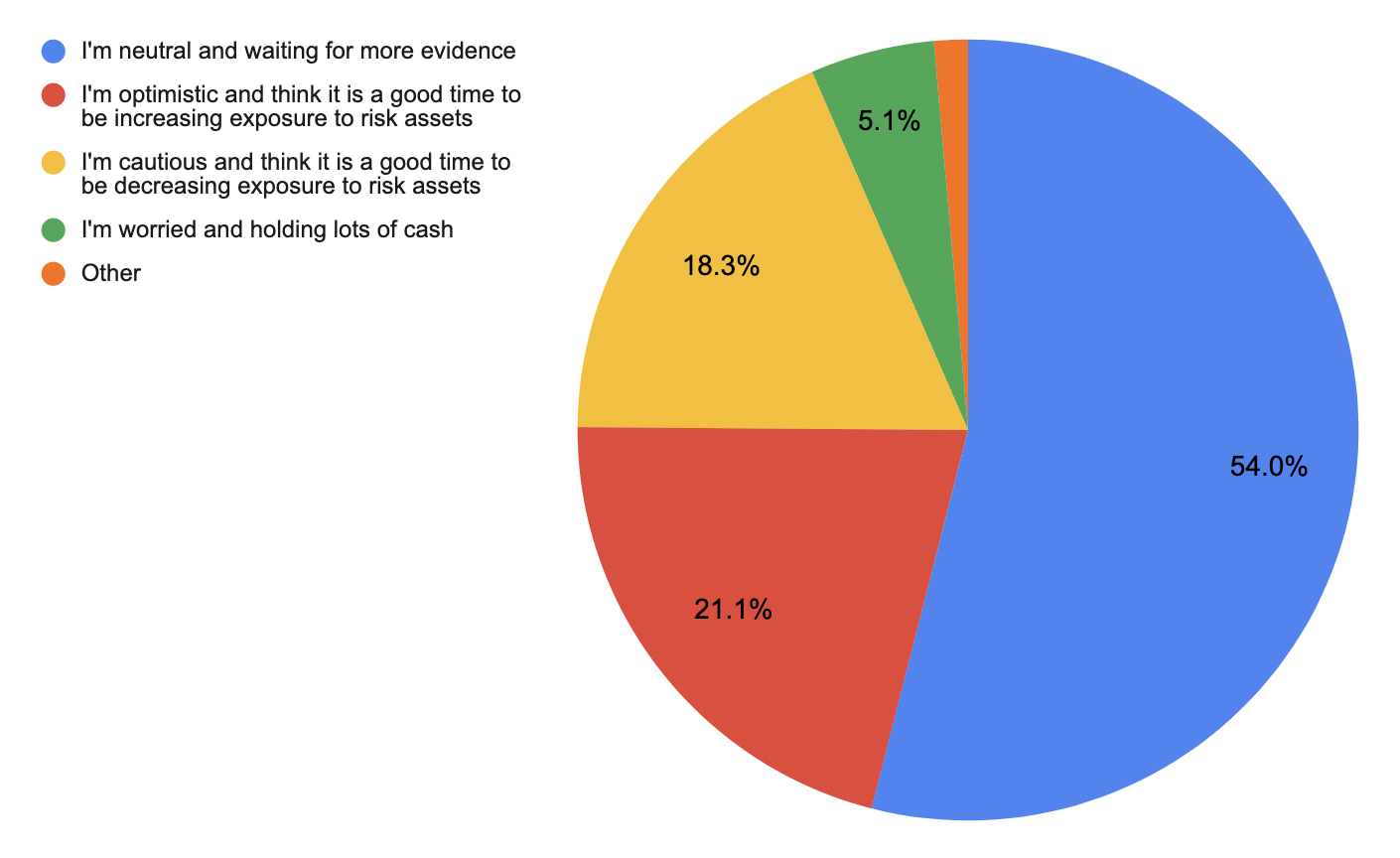
Before delving into the specific strategies our readers are using in the ETP space, we thought it helpful to understand how the market is viewed generally. According to survey responses, the market outlook is largely neutral, with a roughly equal number of individuals responding with either bullish or bearish answers.
Which of the following exchange-traded products do you use in your investment portfolio?
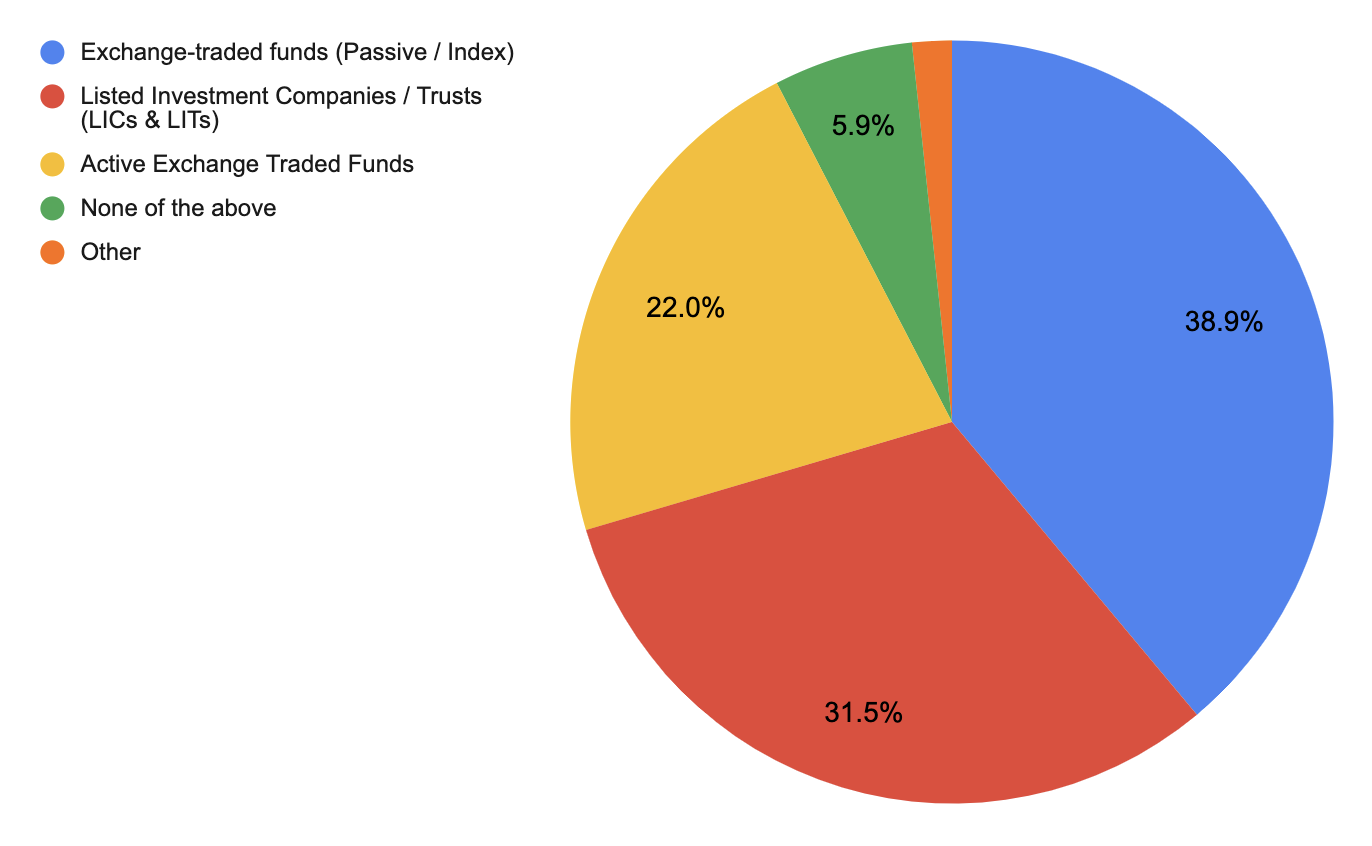
- The largest category of ETPs utilised by survey respondents was passively managed/index funds.
- Coming in at a close second were Listed Investment Companies (LICs) and Listed Investment Trusts (LITs).
- In third place came actively managed ETFs, although even this category made up 22% of survey responses.
It seems each of the three core ETP types is well represented amongst the portfolios of our readers, although there is a slight preference for passive/index funds.
What percentage of your portfolio is invested in exchange-traded products?
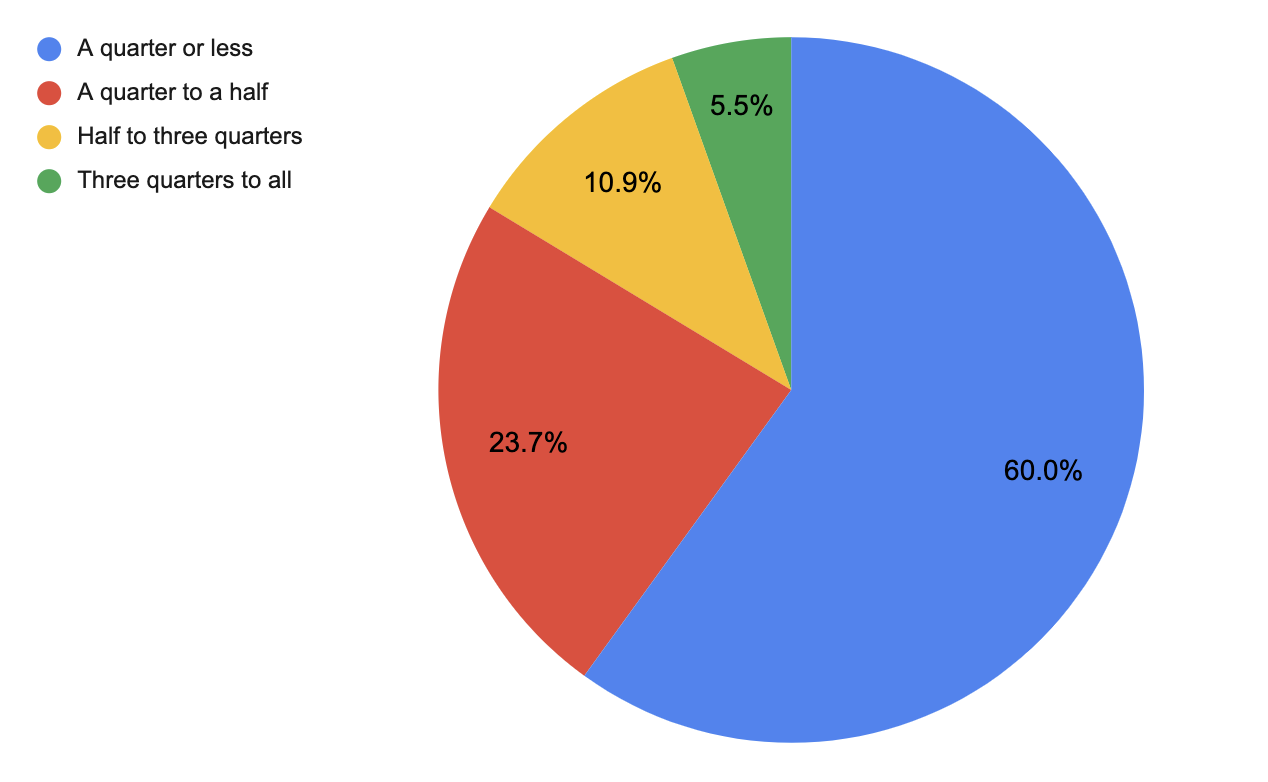
From the prior question, we can see that 5.9% of survey respondents don't invest in ETPs. Taking this into consideration, around 54% of respondents who invest in ETPs do so with a quarter or less of their portfolio.
Based on comments left on the latest survey, many from this group seek to use ETPs as a mechanism for cheap and easy portfolio diversification – while still investing directly in equities or other actively-managed funds.
Fewer investors exist at higher weightings increments, although 5.5% of respondents allocate more than 75% of their portfolio to ETPs – which is still a significant portion. Comments left here suggest these individuals make this choice based on either a high conviction for the products selected, or the simplicity of investing in a particular ETP in comparison to analysing individual stocks for opportunities.
Are you able to build your perfect portfolio using the range of exchange-traded products currently listed on the ASX?
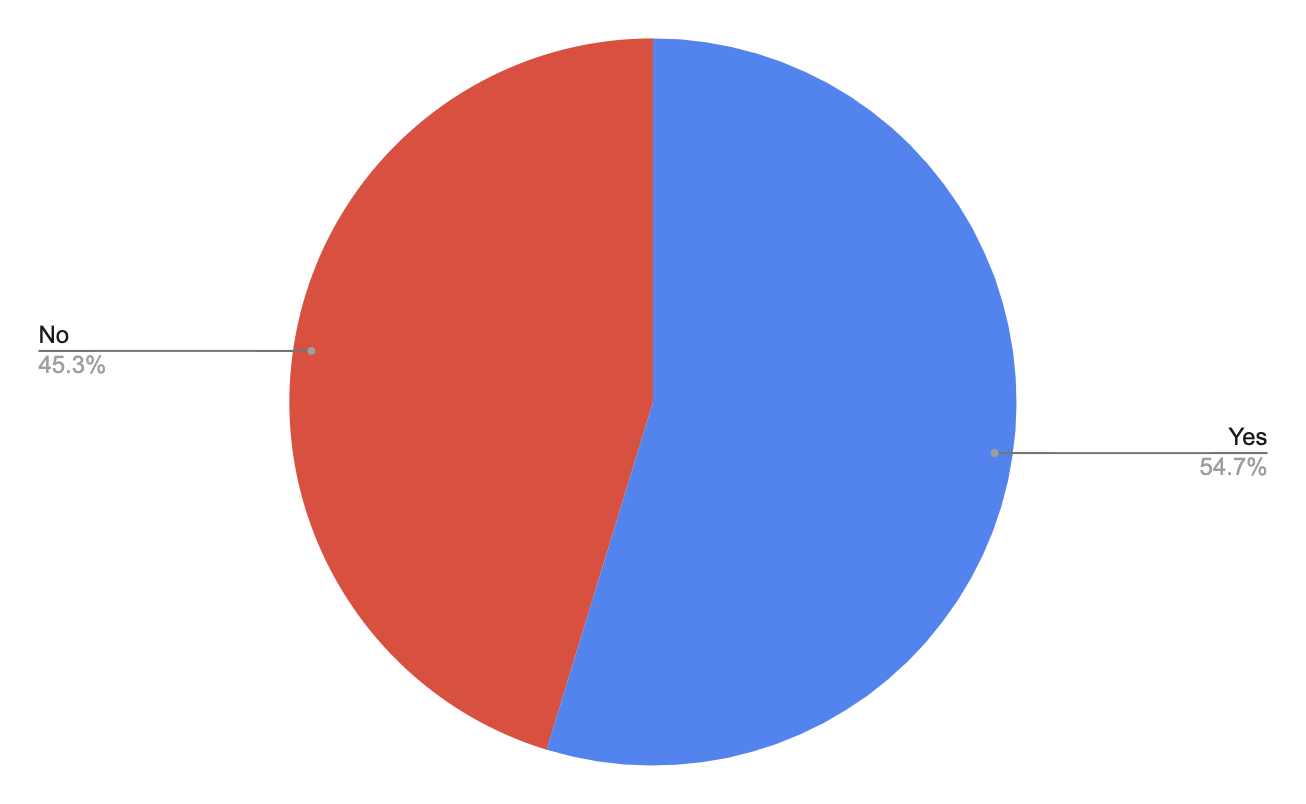
Most survey respondents believe that it's possible to construct the perfect portfolio using exchange-traded products.
Where is there a gap or need in your portfolio that isn't currently available as an exchange-traded product?
Having personally read every response (yes, all of them), one of the most common answers to this question was increased exposure to emerging markets, in particular India. Many respondents made a point of specifying their preference was ex-china, citing concerns with pre-existing exposure to the geography.
A second common response was a desire for access to international growth opportunities, specifically in either US tech, artificial intelligence, or cyber security. Respondents seem to see long-term opportunities in the space after prices sank with rising interest rates.
Further common responses were:
- More small caps focused options (especially mining stocks)
- Exposure to unlisted real estate/private equity
- More alternative investing opportunities
- Fewer 'fads' and trend-chasing ETFs.
Some quotes straight from reader responses:
"Unlisted infrastructure. Alternatives such as water rights."
"Emerging markets are poorly covered"
"None, there are already too many"
What are the primary reasons you use exchange-traded products?
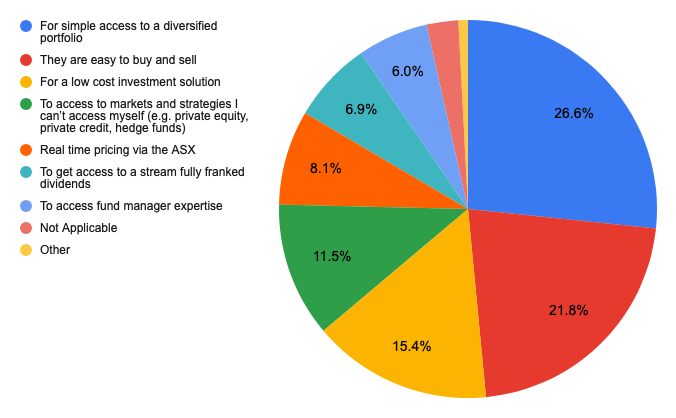
Approximately half of the survey respondents prefer ETPs for convenience-related purposes; whether for the simpler process of diversifying their portfolios using exchange-traded products, or the liquidity they provide allowing for easier entries and exits from the market.
A further 25% of investors selected ETPs for their ability to create easier access to otherwise hard-to-reach corners of the market. In particular, investments were selected based on increased access to:
- Markets and strategies otherwise hard to access (Private equity, private credit, hedge funds)
- Fund manager expertise
- Fully franked dividend streams.
How long do you typically hold an exchange-traded product?
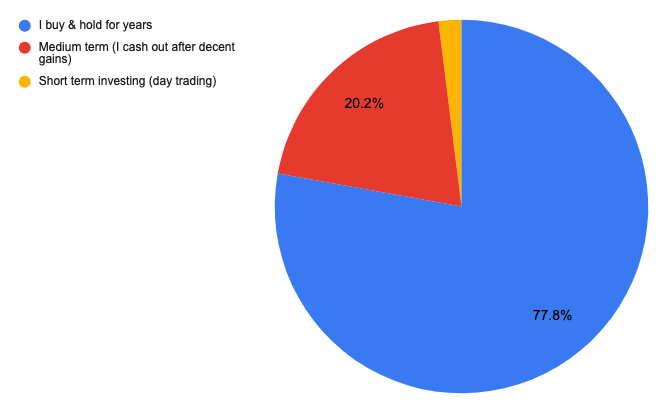
Most ETP investors buy and hold for the long term. There is a subset who use them as part of a medium-term strategy, and interestingly, a small fraction of respondents indulge in day trading with exchange-traded products.
Which of the following best describes the way you use exchange-traded products?
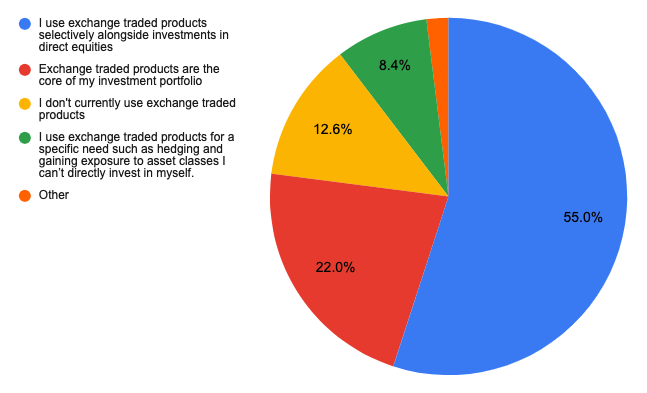
Of the survey respondents, 55% use ETPs "selectively", while directly investing in equities for the majority of their holdings. This correlates closely with the results of question 3.
A further 22% place more reliance on ETPs, describing them as the core of their portfolio – though it is likely that many of these individuals also utilise satellite (or non-core) investments in direct equities or other specific asset classes.
For 8.4% of investors, ETPs are most valuable as a strategic asset, whether that be for hedging, or gaining exposure to otherwise hard-to-access asset classes as discussed in question 6.
Which of the following is most important to you when selecting exchange-traded products?
Readers were asked to rank the following statements in terms of importance. The average ranking was as follows:
- Low expense ratio
- Brand of the fund manager
- Liquidity of the fund
- How long the ETP has existed
This ranking likely follows from the passive nature of many ETPs. Many products are aimed at matching indices, and so excessive fees mean investors would lag behind the market average.
Which of the following types of exchange-traded products do you find most appealing?
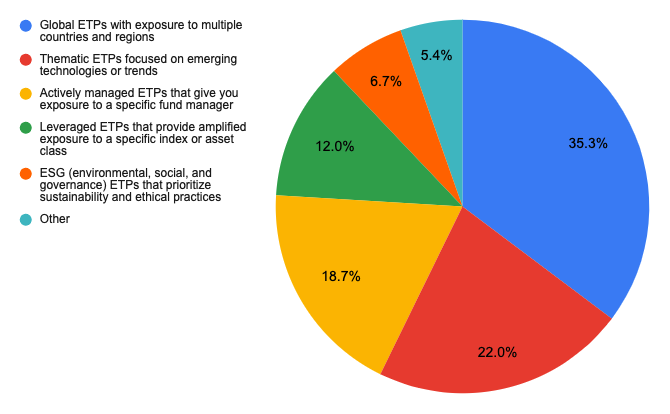
The responses to this question again illustrate investors' desire to access different geographies utilising exchange-traded products. A key reason for this is the logistical challenges of purchasing international assets – alongside the sheer volume of work required to understand and pick stocks in multiple different economies with different cultures, languages, and regulations.
Thematic ETPs also appear quite popular among investors, with many seeking access to particular sectors, or trends. According to comments on the survey, the biggest current trends are American Tech, and Emerging Markets (often excluding China).
Active funds also made a strong showing in responses here, with 18.7% of respondents quoting this as the most appealing product traded on exchanges. Among the many comments, Wilson Asset Management emerged as a common preference.
Check out the Australian ETF Directory on Market Index
Visit Market Index for a comprehensive list of ASX Exchange Traded Funds. From broad index exposure through to commodities and specific thematics. The Australian ETF Directory helps you discover and research hundreds of ETFs.
5 topics


